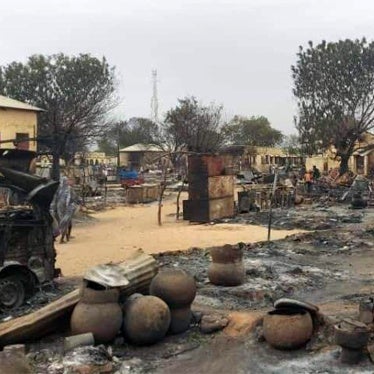Hon. Kabiru Tanimu Turaki
Chairman
Committee on Dialogue and Peaceful Resolution of Security Challenges in the North
Office of the President
Abuja, Nigeria
June 24, 2013
Dear Honorable Minister,
Human Rights Watch writes regarding the work of your committee to develop an amnesty framework for members of the militant Islamist group Boko Haram. As discussed below, we urge the committee to ensure that, in the interests of victims, the rule of law, and long-term peace in Nigeria, any proposal on amnesty exclude serious crimes committed in violation of international law.
As you well know, Boko Haram has carried out a brutal campaign of violence across northern Nigeria. The group has primarily targeted government security personnel, Christians living in the north, and Muslims critical of the group or seen as cooperating with the government. Boko Haram has claimed responsibility for numerous attacks, including suicide bombings, on police and military facilities, church services, the United Nations building in Abuja, newspaper offices, markets, and schools.
Human Rights Watch released a report in October 2012 on the spiraling violence and concluded that Boko Haram’s widespread and systematic attacks on civilian populations, including the murder of civilians and the persecution of Christians, likely amount to crimes against humanity under international law.
We also documented serious human rights abuses carried out by government security forces in response to these attacks, including dozens of extrajudicial killings, burning of civilian property, and detention-related abuses. Human Rights Watch estimates that since 2009 more than 3,600 people have been killed in attacks by Boko Haram or splinter groups, clashes between these groups and government security forces, and extrajudicial killings by security forces. In all but a handful of cases, no one has been brought to justice for these crimes. The government should investigate and prosecute human rights abuses committed in Nigeria, including by members of Boko Haram and government security personnel, without delay and in accordance with international fair trial standards.
The Office of the Prosecutor (OTP) of the International Criminal Court (ICC) announced in 2010 that it had opened a preliminary examination of the situation in Nigeria, and in November 2012 found that there was a “reasonable basis to believe” that Boko Haram has committed acts that constitute crimes against humanity; the OTP further decided to move to a next phase of examination, namely to assess if “the national authorities are conducting genuine proceedings in relation to those who appear to bear the greatest responsibility for such crimes, and the gravity of such crimes” (OTP Report on Preliminary Examination Activities 2012, p. 20-22).
The ICC has the authority to intervene when the domestic authorities are unable or unwilling to investigate or prosecute serious crimes in violation of international law according to the ICC’s Rome Statute, to which Nigeria is a party (Rome Statute, art. 17). Moreover, international law generally provides that such crimes should be prosecuted, which is well reflected in the UN’s Updated Set of Principles for the Protection and Promotion of Human Rights through Action to Combat Impunity (E/CN.4/2005/102/Add.1, principle 19), the International Covenant on Civil and Political Rights (A/6316, art. 2(3)), and Basic Principles and Guidelines on the Right to a Remedy and Reparation for Victims of Gross Violations of International Human Rights Law and Serious Violations of International Humanitarian Law (G.A. Res. 60/147, parts VII and VIII). The Convention against Torture and the Geneva Conventions, to which Nigeria is a party, also expressly call for fair prosecutions of serious crimes.
The UN principles expressly address amnesties, stating: “Even when intended to establish conditions conducive to a peace agreement or to foster national reconciliation, amnesty and other measures of clemency” should not extend to serious crimes (E/CN.4/2005/102/Add.1, principle 24). The UN secretary-general’s seminal 2004 report on transitional justice similarly notes that peace agreements should “[r]eject any endorsement of amnesty for genocide, war crimes, or crimes against humanity” (S/2004/616, para. 64(c)). The African Commission on Human and Peoples’ Rights’ Principles and Guidelines on the Right to a Fair Trial and Legal Assistance in Africa states that “the granting of amnesty to absolve perpetrators of human rights violations from accountability violates the right of victims to an effective remedy” (DOC/OS(XXX)247, art. C(d)).
Consistent with this approach, when the 1999 Lomé Peace Accord on the Sierra Leone conflict was negotiated, the UN special representative attached a reservation to the agreement indicating that the amnesty provisions would not beapplicable to genocide, crimes against humanity, war crimes, and other serious violations of international humanitarian law.
But it is not only international legal obligations that make justice necessary. Experience by Human Rights Watch over the past 20 years in many different countries suggests that the impact of justice is too often undervalued when weighing objectives in resolving an armed conflict. In a 2009 report, “Selling Justice Short,” we found that insisting on justice for grave crimes has not meant an end to peace talks, such as in the former Yugoslavia. Peace built on impunity, however, all too often leads to renewed cycles of violence. Prosecutions send the message, especially to would-be perpetrators, that no one is above the law. This helps cement peace and stability, in addition to giving redress to victims.
The challenge to find a solution to the conflict with Boko Haram and restore stability to northern Nigeria is indeed complex. But amnesty for serious crimes is not the answer. It would run counter to Nigeria’s legal obligations, the rule of law, and the interests of victims. In this context, we urge you to avoid proposing any amnesty that extends to serious crimes and reiterate our call for investigation and prosecution of these crimes.
Yours sincerely,
Daniel Bekele
Executive Director
Africa Division
Richard Dicker
Director
International Justice Program
Cc: Attorney General of the Federation and Minister of Justice Mohammed Bello Adoke






